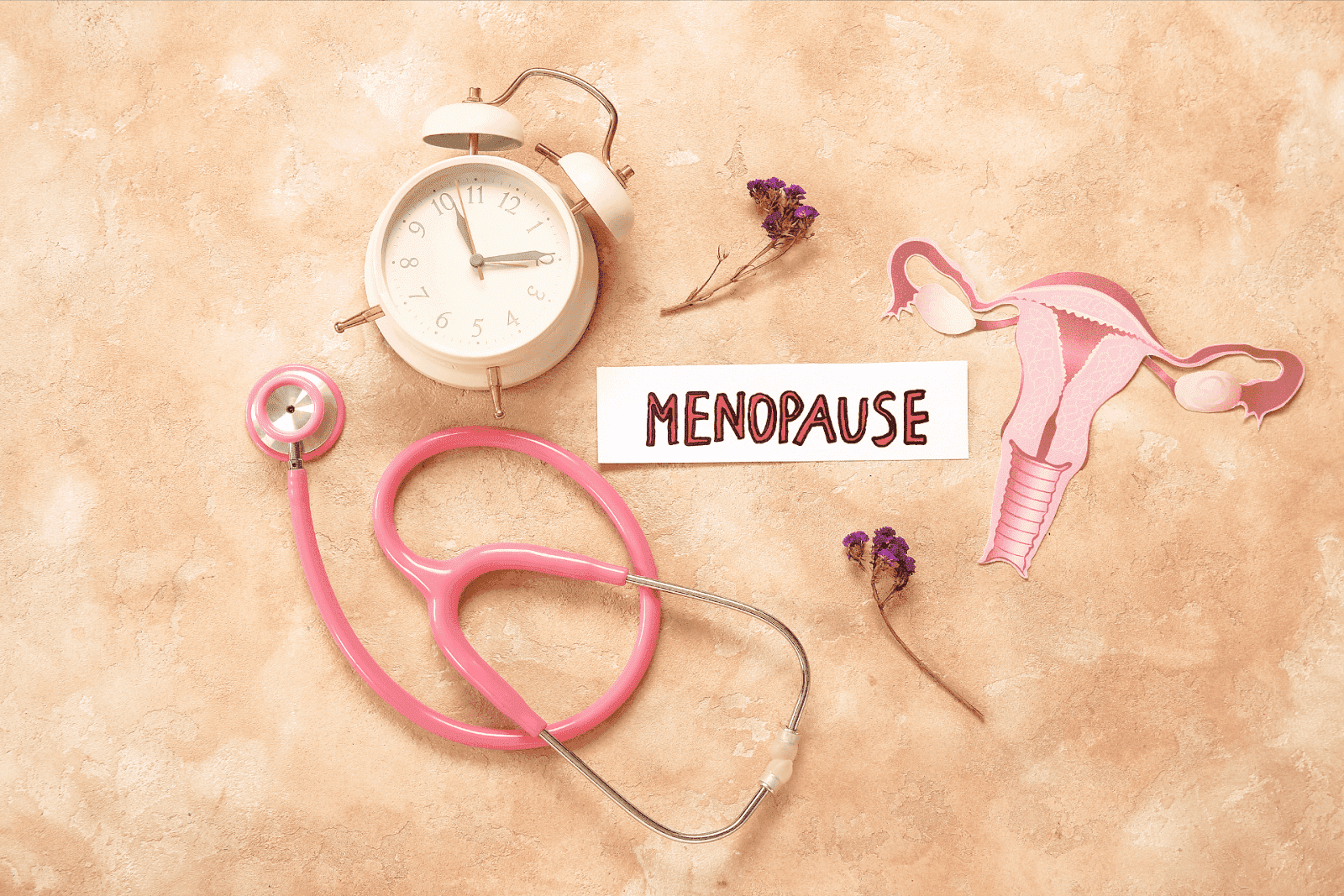Many women experience changes in their bodies that can feel confusing, unsettling, or even alarming. If you’ve been feeling different lately, whether it’s unexpected mood swings, hot flashes, or trouble sleeping, these could be signs of menopause. Understanding menopause symptoms is crucial for managing this natural phase of life with confidence and care.
Menopause marks the end of a woman’s reproductive years, but the transition can bring a wide range of physical and emotional changes. This article explores the common symptoms, what causes them, and how modern healthcare options like telehealth can support you through this journey.
What Is Menopause? Understanding the Basics
Menopause is defined as the point in time when a woman has not had a menstrual period for 12 consecutive months. It typically occurs between the ages of 45 and 55, but the timing and experience can vary widely. The years leading up to menopause, called perimenopause, often involve fluctuating hormone levels that cause many of the symptoms women notice.
During menopause, the ovaries gradually produce less estrogen and progesterone, hormones that regulate the menstrual cycle and impact many other bodily functions. This hormonal shift is responsible for most menopause symptoms, which can range from mild to severe. Common symptoms include hot flashes, night sweats, mood swings, and vaginal dryness, all of which can significantly affect a woman's quality of life. Understanding these changes is crucial for women as they navigate this natural phase of life.
 Perimenopause: The Transition Phase
Perimenopause: The Transition Phase
Perimenopause can last several years and is characterized by irregular periods, changes in menstrual flow, and the onset of symptoms such as hot flashes and sleep disturbances. Many women don’t immediately recognize these changes as related to menopause, which can make the experience confusing. During this time, some women may also experience increased anxiety or changes in libido, adding to the emotional and physical challenges of this transitional phase.
Recognizing perimenopause symptoms early can help you seek appropriate care and make lifestyle adjustments to ease the transition. For instance, incorporating regular exercise, maintaining a balanced diet, and practicing stress-reduction techniques such as yoga or meditation can be beneficial. Additionally, discussing symptoms with healthcare providers can lead to effective management strategies, whether through lifestyle changes or potential hormone replacement therapy. Understanding that this is a natural process can empower women to embrace this stage of life with knowledge and confidence.
Common Menopause Symptoms: What to Expect
Menopause symptoms vary greatly among women, but some are more common and widely recognized. Here’s a breakdown of the most frequent signs to watch for:
1. Hot Flashes and Night Sweats
Hot flashes are sudden feelings of intense heat, often accompanied by sweating and flushing of the skin. They can last from a few seconds to several minutes and may occur multiple times a day. Night sweats are hot flashes that happen during sleep, leading to discomfort and disrupted rest.
These symptoms are caused by changes in the body’s temperature regulation system, influenced by declining estrogen levels. Many women find that lifestyle factors, such as diet and stress, can exacerbate these symptoms. For instance, spicy foods, caffeine, and alcohol are known triggers that can intensify hot flashes. Keeping a journal to track these triggers can be helpful in managing them more effectively.
2. Irregular Periods
As menopause approaches, menstrual cycles become less predictable. Periods may be heavier or lighter, and the time between cycles can vary. Eventually, periods stop altogether, marking the official onset of menopause. This transitional phase, known as perimenopause, can last several years, and during this time, women may experience a range of symptoms that can be both physical and emotional.
Understanding this phase is crucial, as it can also be a time of significant change in other areas of life, such as family dynamics and career. Some women find that this period allows them to reflect on their personal goals and aspirations, leading to a renewed sense of purpose as they navigate this new chapter.
3. Mood Changes and Emotional Symptoms
Many women report mood swings, irritability, anxiety, or feelings of sadness during menopause. These emotional changes are linked to hormonal fluctuations but can also be influenced by sleep problems and life stressors. The interplay between hormones and emotions can be complex, and some women may find that they are more sensitive during this time.
Engaging in regular physical activity, practicing mindfulness, and seeking support from friends or professionals can be beneficial in managing these emotional symptoms. Additionally, some women find that exploring creative outlets, such as writing or art, can provide a therapeutic way to express their feelings and cope with the changes they are experiencing.
4. Sleep Disturbances
Difficulty falling asleep or staying asleep is common during menopause. Night sweats can worsen sleep quality, leading to fatigue and difficulty concentrating during the day. The impact of sleep disturbances can extend beyond just feeling tired; it can affect mood, cognitive function, and overall quality of life.
Establishing a calming bedtime routine, reducing screen time before bed, and creating a comfortable sleep environment can help improve sleep quality. Some women also benefit from relaxation techniques, such as yoga or meditation, which can promote better sleep and reduce stress levels.
5. Vaginal Dryness and Discomfort
Lower estrogen levels can cause thinning and drying of the vaginal tissues, leading to discomfort during intercourse and an increased risk of infections. This symptom can significantly impact intimacy and relationships, often leading to feelings of frustration or embarrassment.
Fortunately, there are various treatment options available, including vaginal moisturizers and lubricants, as well as hormone replacement therapy (HRT) for those who may need it. Open communication with partners and healthcare providers can help women navigate these changes and find solutions that work for them.
6. Changes in Skin and Hair
Menopause can affect skin elasticity and hair thickness, sometimes causing dryness, thinning hair, or hair loss. These changes can be distressing for many women, as they may feel that their appearance is changing in ways they do not welcome.
Incorporating a skincare routine that focuses on hydration and nourishment can help mitigate some of these effects. Additionally, exploring new hairstyles or hair care products can empower women to embrace their evolving beauty. Many women find that this stage of life offers an opportunity to redefine their self-image and prioritize self-care in ways that they may not have before.
Why These Symptoms Matter: Health Implications Beyond Discomfort
While menopause symptoms can be challenging, they also signal important changes in your overall health. For example, the decline in estrogen increases the risk of osteoporosis and cardiovascular disease. Understanding these risks allows women to take proactive steps to protect their long-term health.
Ignoring symptoms or delaying care can lead to unnecessary suffering and missed opportunities for prevention and treatment.
Bone Health and Menopause
Estrogen helps maintain bone density, so its decline during menopause can lead to bone loss and increased fracture risk. Women should discuss bone health with their healthcare providers and consider screening and preventive measures.
Heart Health Considerations
Menopause is associated with changes in cholesterol levels and blood pressure, increasing the risk of heart disease. Regular check-ups and lifestyle modifications are essential during this time.
How to Manage Menopause Symptoms Effectively
Managing menopause symptoms involves a combination of lifestyle changes, medical treatments, and supportive care. Every woman’s experience is unique, so personalized care is key.
Lifestyle Adjustments
Simple changes can significantly ease symptoms. These include:
Maintaining a balanced diet rich in calcium and vitamin D
Engaging in regular physical activity to support bone and heart health
Practicing stress-reduction techniques such as yoga or meditation
Establishing good sleep hygiene to improve rest
Avoiding triggers for hot flashes, like spicy foods, caffeine, and alcohol
Medical Treatments
Hormone replacement therapy (HRT) is effective for many women but may not be suitable for everyone. Non-hormonal medications and vaginal estrogen creams are other options. It’s important to discuss the benefits and risks of these treatments with a healthcare provider.
Seeking Support Through Telehealth
Accessing expert care has never been easier thanks to telehealth services. Doctronic.ai offers convenient, affordable, and personalized medical consultations from the comfort of your home. Whether you have questions about symptoms, treatment options, or need a second opinion, AI-powered telehealth can provide fast, accurate, and compassionate care 24/7.
Doctronic.ai combines cutting-edge artificial intelligence with the expertise of licensed doctors to deliver modern primary care that remembers your history and adapts to your needs. Over 10 million people have already benefited from this innovative approach to healthcare.
When to See a Doctor: Recognizing Warning Signs
While menopause is a natural process, some symptoms warrant prompt medical attention. If you experience any of the following, consult a healthcare professional:
Heavy or prolonged bleeding
Severe or persistent hot flashes interfering with daily life
Sudden or unexplained weight loss
Signs of depression or anxiety that affect your well-being
Bone pain or fractures
Using the telehealth services from Doctronic.ai can be a significant first step to discuss these symptoms and get personalized advice quickly.
 Embracing the Change: Menopause as a New Chapter
Embracing the Change: Menopause as a New Chapter
Menopause is more than just a collection of symptoms; it’s a transition into a new phase of life that offers opportunities for growth, self-care, and empowerment. With the right knowledge and support, women can navigate menopause with confidence and maintain vibrant health.
Modern tools like AI-powered telehealth platforms are transforming how women access care during this time, making expert guidance more accessible than ever before.
Personalized Care for Every Stage of Menopause
If you’ve been feeling different lately, it’s worth considering whether menopause symptoms might be the cause. From hot flashes and mood changes to sleep disturbances and vaginal dryness, these signs are common but manageable with the right approach.
Don’t hesitate to seek medical advice to understand your symptoms better and explore treatment options. Telehealth services from Doctronic.ai offer a convenient, affordable, and personalized way to connect with healthcare professionals who can help you through every step of this journey.
Remember, menopause is a natural part of life, and with the right care, it can be a positive and empowering experience.
Experience Personalized Care with Doctronic
If you're navigating the complexities of menopause and seeking a smarter, more personal healthcare experience, Doctronic is here for you. Our AI-powered platform offers immediate, free AI doctor visits, providing you with accurate diagnoses and treatment recommendations based on the latest medical research. With Doctronic, you'll receive care that's not only fast but also tailored to you, remembering every detail of your health history. For a more in-depth consultation, our telehealth video visits connect you with our doctors anytime, anywhere, for less than $40. Say goodbye to waiting rooms and start your journey to better health today. Skip the line. Talk to an AI Doctor Now, for free.



 Perimenopause: The Transition Phase
Perimenopause: The Transition Phase Embracing the Change: Menopause as a New Chapter
Embracing the Change: Menopause as a New Chapter